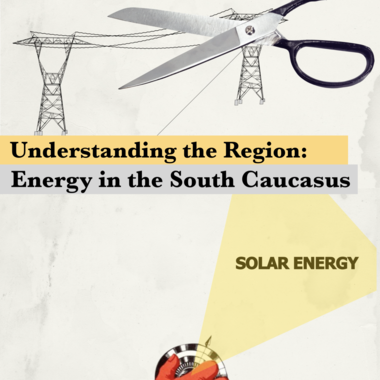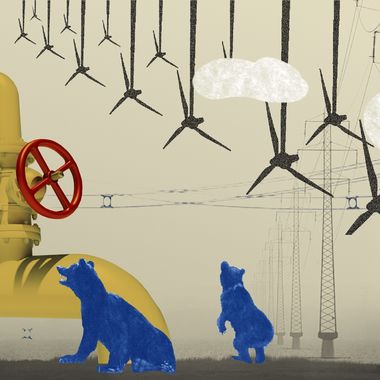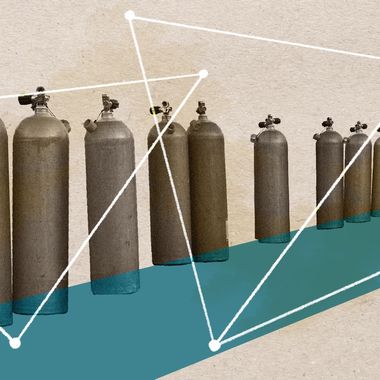
Illustration by Armine Shahbazyan.
As Armenia seeks to develop a new national security framework following the defeat in the 2020 Artsakh War, relations with Iran could play an increasingly important role.
The two neighbors have longstanding ties and a strategic partnership that includes a natural gas pipeline critical for the diversification of Armenia’s energy needs. The Iranian section of the 141 km pipeline, which became operational in 2007, runs from Tabriz to the Armenia-Iran border; the Armenian section runs from Meghri to Kajaran.
Developing and strengthening strategic ties with Iran is crucial, taking into consideration that Armenia has closed borders with Turkey and Azerbaijan. Armenia cooperates with Iran in the fields of transportation, environment, healthcare, agriculture, science, education and culture, including interregional cooperation. Despite not yet gaining momentum, the establishment of the Meghri Free Economic Zone in 2017 on the Armenian-Iranian border seeks to lay a foundation to strengthen economic ties with Iran and simultaneously address the socio-economic challenges of Armenia’s Syunik region.
Although Armenia is one of the shortest options for connecting Iran to the Black Sea, Armenia has not been able to realize its potential to become a transit country since gaining independence. The Persian Gulf-Black Sea International Transport Corridor, which has been under development for years, is currently being actively discussed. Armenian officials are engaged in negotiations with Iran, Georgia, Bulgaria and Greece over plans for the landmark infrastructure project. An agreement is expected in the near future that could form the basis for strategic intensification of Armenia’s bilateral ties with Iran in particular. The blueprint for the project envisages construction of a transport corridor from Iran to the Black Sea via Armenia and Georgia, with Bulgaria and Greece set to serve as gateways to the European Union from there. During a visit to Armenia in May 2021, speaking about bringing the Persian Gulf-Black Sea International Transport Corridor back to life, Iran’s Minister of Roads and Urban Development Mohammed Eslami expressed Iran’s interest in expanding auto and rail communication with Armenia and potentially being involved in the construction of the southern parts of Armenia’s North-South highway.
Iran views Armenia as a natural transit route to the Black Sea region and ultimately to European markets. As Tehran seeks to make progress toward the relaxation of international sanctions, parallel efforts are also underway to develop this route. Iranian policymakers are believed to seek alternatives to existing Azerbaijani and Turkish corridors, and are eager to counter efforts by Moscow and Ankara to marginalize Iranian influence in the region. Both Russia and Turkey consider Iran a regional competitor and are motivated not to see it strengthen its position in the region.
One of the core objectives of the Persian Gulf-Black Sea International Transport Corridor initiative is the strengthening of commercial and economic ties throughout the region. In addition to the international transit function, the corridor would also lead to standardization and improvements of management and warehousing functions. It would help facilitate a remarkable change in road safety standards across the region, improving efficiency.
Recent changes in the geopolitical climate make this initiative significantly more feasible. Following the 2020 Artsakh War, the trilateral statement signed by the leaders of Armenia, Azerbaijan and Russia stipulates the unblocking of economic and transport links in the region. According to the terms of the agreement, Armenia is obliged to facilitate unimpeded transport links between Azerbaijan and its Nakhichevan exclave.
Azerbaijan wants this connection link to be a corridor over which it will have sovereign rights. Armenia opposes that concept, arguing that its sovereignty over its own territory cannot be compromised. Currently, most transport to and from Nakhichevan and the rest of Azerbaijan travels through Iran. Thus, travel through Armenia would reduce Azerbaijan’s dependence on Iran.
In contrast, the Persian Gulf-Black Sea infrastructure project is in line with the interests of both Iran and Armenia. Crucially, it has the potential to serve as a lifeline for Armenia. As the project has both economic and security dimensions, it is possible to argue that it would increase cooperation and strengthen regional security. This is in the interests of all potential participating countries, and is also arguably the best way to guard against future attempts to destabilize the South Caucasus region.
The future of the Persian Gulf-Black Sea International Transport Corridor depends on a number of geopolitical factors. The Iranian economy is currently facing major challenges due to the ongoing impact of international sanctions, but the prospect of sanctions relief remains. If sanctions are relaxed or removed by the Biden administration, Tehran would have access to significant funds to finance construction works tied to the corridor.
The lifting of sanctions would also open the door to a further deepening of Armenia’s own engagement with Tehran. Sanctions have long served to limit the scope of cooperation with Iran, but the removal of this obstacle would provide new impetus for Yerevan and Tehran to intensify their ties. The ambitious plans for a major transport road would necessarily form a central part of any negotiations on a strengthening of the strategic relationship.
Related Articles
Understanding the Region: Energy in the South Caucasus
By Karena Avedissian
Once-integrated energy channels were disrupted with the fragmentation of the Soviet Union, Armenia, Azerbaijan and Georgia began rebuilding their impaired energy infrastructures. How have these countries with different degrees of European and Russian influence and different energy needs and natural oil and gas reserves fared so far and what do they have in common?
Laying Off the Gas: Energy Security in Armenia
By Yelena Vardanyan
Diversifying Armenia’s energy sources is a strategic need of national importance. The coming decade presents an opportunity to turn direction and tackle the considerable obstacles facing the country. Strong political commitments and a focused approach are needed to make real progress.
Southern Gas Corridor Brings Azerbaijani Gas to the EU
By Anna Barseghyan
The operation of the Southern Gas Corridor raises the geopolitical significance of Azerbaijan and Turkey, contributing to the further isolation of Armenia from regional projects. The EU seems to limit its concern about human rights violations and war crimes in Artsakh to mere lip service.






